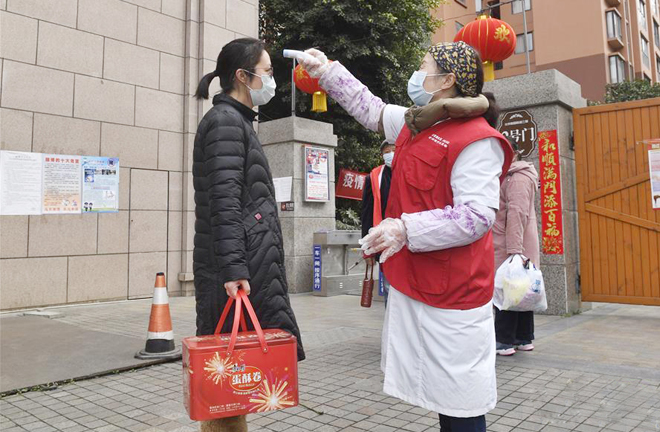Public response to COVID-19 improves on past emergencies

A volunteer is measuring a resident’s body temperature at the entrance of a community in Chengdu, Sichuan Province. Photo: XINHUA
On the outbreak of virus and even the risk of death, some healthcare workers and government staff members have gone to the front line. Meanwhile, the majority of individuals have been staying inside their apartments and homes. With closer examination, we can see changes and progress in how people have responded to the COVID-19 outbreak relative to prior crises.
China has seen the growing involvement of social forces and residential communities. Since the outbreak this time, people have voluntarily set up online chat rooms to swap information and tackle many problems on their own through resource mobilization and coordinated action. Unfamiliar neighbors in cities and atomized residents in the countryside have spontaneously organized themselves to take prevention and control measures countering the virus, such as stay-at-home quarantines, disinfection and self-protection. They also have organized resources delivered to support those on the front line. Residential communities have thus performed their function. Cases are plentiful in which people who had known little about their communities have turned to neighbors for help, helping strengthen neighbor relations. These cases have helped build an abundant stock of social capital for future governance targeting communities and the country. Also, they form a novel sample on how to exercise social agency.
People have been highly cooperative with governmental actions. To halt the epidemic, Hubei Province, especially Wuhan, has temporarily shut down transportation, causing huge inconvenience to production and daily life. People across cities and villages, however, are following the country’s unified arrangement. Their cooperation helps avoid massive panic buying, panicked fleeing or confrontation with regulatory policies. The closedown cities have run themselves in an organized manner, forming a great improvement from prior emergencies in which governments at all levels often consumed excessive resources and manpower on mobilization. The people’s active and cooperative efforts have not only saved valuable resources but also laid foundation for the prevention and control work.
The general public has become more alert to rumors. Information about emergencies often comes late due to its suddenness, and this might unsettle society because of insufficient understanding and the potentially severe consequences. Therefore, rumors are unavoidable. It conforms to the laws of emergence and circulation that a number of rumors came to life during the first few days of the virus outbreak. The rumors, however, died down as governments, particularly people with knowledge of the situation, dispelled them timely. There have been no widespread rumors since then, thanks in part to governments’ appropriate disclosure of information while people’s increased shared knowledge has played a larger role. The current situation marks a giant leap forward relative to prior major emergencies, providing valuable experience for future governance.
The epidemic is new to the general public. The internet and We-Media are likely to fan the flames of irrationality. People, however, have shown collective levelheadedness regarding their handling of COVID-19. In terms of content, bit by bit constructive criticism has replaced toxic venting.
Emotional destruction has given way to unbiased supervision. People have discarded the manic attitude that dominated the outset of the virus battle, and have chosen instead to receive, repost and publish information and opinions with cool heads. The outbreak has also encouraged reflective thinking. As more details started to reveal themselves, after weighing the circumstances of the anti-virus fight, individuals became more considerate of those on the front line.
Society can grow stronger by learning from crises. Progress in the public’s response to COVID-19 is a sign of social development. Still, several issues that may hinder such a positive change demand attention and reflection. In the fight against the epidemic, social agency has been activated and enthusiasm for participation has increased. However, it is noticeable that ordinary people lack unhindered channels for involvement. The internet has also played a big part during this period by providing the public with scientific knowledge, disseminating calls for public action and promoting information concerning spontaneous rescue operations. It has been the most useful tool for people who want to figure out what has happened. Thus, the role of internet users’ opinions should be further expanded.
Xu Xiaojun is a professor from the College of Sociology at Central China Normal University.
edited by MA YUHONG
